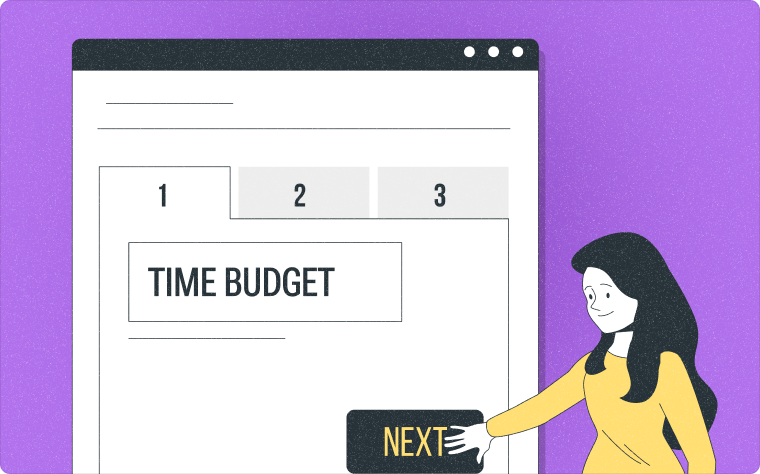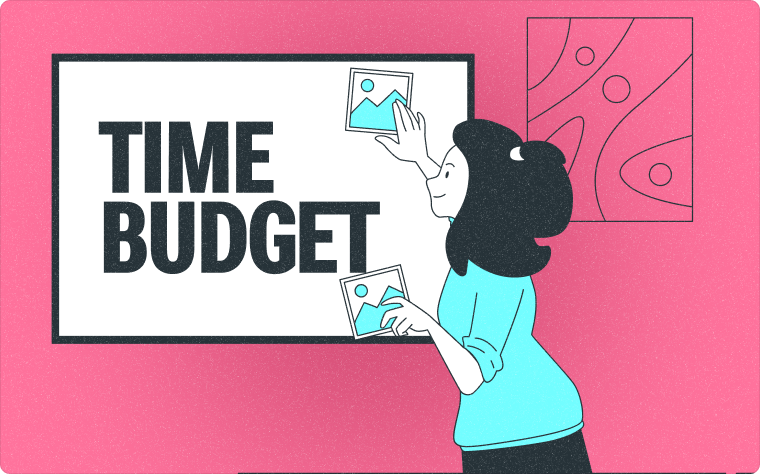Time Budget — a Powerful Trick to Get Everything Done in Time

Time is a valuable resource that we often take for granted, leading to poor time management and a constant feeling of being overwhelmed. A time budget is a strategic tool that helps you make the most of your time and get everything done within a given timeframe. It is an effective way to prioritize tasks, avoid procrastination, and achieve your goals.
According to a study published in the Journal of Personality and Social Psychology, creating a time budget allows individuals to better allocate their time and make progress towards their goals. Furthermore, renowned productivity expert, Laura Vanderkam, states that a time budget helps individuals realize that they have more time available than they think and enables them to use it more effectively.
Here are the five steps to creating a time budget:
However, there are some common mistakes people make when creating a time budget, such as underestimating the time needed for tasks, not factoring in breaks and distractions, and not prioritizing tasks. To stick to your time budget, set reminders and use timers, find an accountability partner, and reward yourself for sticking to the budget.
The benefits of using a time budget include increasing productivity, reducing stress and overwhelm, and helping you achieve your goals. By prioritizing tasks and being mindful of your time, you can make the most of your days and achieve a better work-life balance. In conclusion, a time budget is a powerful tool that can help you accomplish more in less time and live a more fulfilling life.
What Is a Time Budget?
A time budget is a helpful tool for individuals to effectively allocate their time by assigning specific time slots to different tasks or activities. It involves creating a schedule that outlines the necessary time to be spent on each task in order to achieve productivity and meet deadlines. By implementing a time budget, individuals can prioritize their activities and avoid wasting time on unimportant tasks. This also allows for better time management, organization, and focus.
Historical records show that ancient civilizations, like the Egyptians and Romans, utilized similar techniques to efficiently manage their time and tasks.
How Can a Time Budget Help You?
A time budget can greatly assist in managing your time effectively and achieving your goals. Here are the steps to create and utilize a time budget:
By implementing a time budget, you can maximize productivity, reduce stress, and ensure that you have enough time for both work and personal activities. So, how can a time budget help you? By following these steps, you can effectively manage your time and achieve your goals.
Get more out of your business
Get the best employee engagement content every week via mailing list

What Are the Steps to Creating a Time Budget?
Creating a time budget is a useful tool for effectively managing your time and getting all your tasks done in a timely manner. But where do you start? In this section, we will go through the necessary steps to creating a time budget that works for you. From identifying your priorities to being realistic and flexible, each step plays a crucial role in maximizing your time and productivity. Let’s dive in and discover the power of a well-crafted time budget.
1. Identify Your Priorities
Identifying your priorities is a crucial step in creating a time budget to effectively manage your time and tasks. Here are some steps to help you identify your priorities:
Pro-tip: Regularly reassess and adjust your priorities to ensure alignment with your changing goals and circumstances.
2. Determine Your Available Time
To accurately determine your available time for creating a time budget, follow these steps:
Did you know that on average, people spend around 2 hours a day on social media? By accurately determining your available time, you can make better decisions on how to wisely spend it and achieve your goals.
3. Break Down Your Tasks into Smaller Chunks
Breaking down tasks into smaller chunks is an essential step in creating a time budget. This helps in better planning and organization of your time. Here are the steps to effectively break down tasks:
By breaking down tasks, you can tackle them more efficiently, stay focused, and avoid feeling overwhelmed. Fun fact: Breaking down tasks into smaller chunks is a proven technique used by successful individuals to increase productivity and achieve their goals.
4. Allocate Time for Each Task
Allocating time for each task is a crucial step in creating a time budget. Here is a list of steps to follow:
By following these steps, you can ensure that you allocate enough time for each task in your schedule, helping you stay organized and manage your time effectively.
5. Be Realistic and Flexible
Being realistic and flexible is crucial when creating a time budget. Here are the steps to ensure you achieve this:
By following these steps, you can create a time budget that is both realistic and adaptable to ensure optimal productivity.

What Are Some Common Mistakes When Creating a Time Budget?
Creating a time budget can be a powerful tool for managing your daily tasks and responsibilities. However, there are common mistakes that people tend to make when creating a time budget, which can undermine its effectiveness. In this section, we will discuss these mistakes and how to avoid them. From underestimating the time needed for tasks to not factoring in breaks and distractions, we will cover the key pitfalls to watch out for. By learning from these mistakes, you can create a more realistic and efficient time budget that will help you get all your tasks done on time.
1. Underestimating Time Needed for Tasks
Underestimating the time needed for tasks is a common mistake when creating a time budget. To avoid this, follow these steps:
By following these steps, you can avoid the error of underestimating the time needed for tasks and create a more accurate time budget.
2. Not Factoring in Breaks and Distractions
Not factoring in breaks and distractions is a common mistake when creating a time budget. To avoid this, follow these steps:
Remember, breaks and distractions are a natural part of life. By factoring them into your time budget, you can maintain focus and productivity while still allowing yourself some downtime.
3. Not Prioritizing Tasks
Not prioritizing tasks can lead to inefficiency and missed deadlines. To avoid this, follow these steps:
In a similar situation, a colleague who constantly struggled with completing their work on time was able to improve by learning to prioritize tasks. By focusing on high-value activities and meeting deadlines, they were able to reduce stress and increase productivity. Prioritization truly made a difference in their overall success.

How to Stick to Your Time Budget?
A time budget is a powerful tool for managing your daily tasks and maximizing your productivity. However, sticking to your time budget can be challenging without the right strategies in place. In this section, we will discuss practical tips on how to stick to your time budget effectively. From setting reminders and timers, to finding an accountability partner, and even rewarding yourself for meeting your budget goals, we’ll cover it all. So, let’s dive in and start mastering your time management skills.
1. Set Reminders and Timers
Setting reminders and timers is an essential step in effectively managing your time and sticking to your time budget. Here are the necessary steps to incorporate this practice:
2. Find an Accountability Partner
Having an accountability partner when creating a time budget can greatly increase your chances of success. Here are steps to finding an accountability partner:
Jane struggled with time management and constantly felt overwhelmed. She reached out to her friend Sarah, who had successfully improved her own time management skills. Sarah agreed to be Jane’s accountability partner, and together they worked on creating time budgets and checking in weekly. With Sarah’s support and encouragement, Jane was able to stay on track, meet her deadlines, and reduce her stress levels significantly.
3. Reward Yourself for Sticking to the Budget
Rewarding yourself for sticking to your time budget can provide motivation and reinforce positive habits. Here are some suggestions for rewarding yourself:
Remember, rewards should be meaningful to you and provide a sense of satisfaction.

What Are the Benefits of Using a Time Budget?
When it comes to managing our time effectively, having a time budget can be a game changer. This simple yet powerful tool allows us to allocate our time wisely and prioritize our tasks. In this section, we will explore the benefits of using a time budget in our daily lives. From increasing productivity and reducing stress to helping us achieve our goals, a time budget can greatly improve our overall time management skills. So, let’s dive into the benefits and see how incorporating a time budget can make a significant difference in our lives.
1. Increases Productivity
A time budget can significantly increase productivity by helping you manage your time effectively and efficiently. Here are some steps to follow when creating a time budget:
By following these steps and using a time budget effectively, you can increase your productivity and accomplish more in less time.
2. Reduces Stress and Overwhelm
Creating a time budget can help alleviate stress and overwhelm by providing structure and organization to your daily routine. Here are some steps to follow when using a time budget:
By following these steps, you can effectively manage your time, reduce stress, and avoid feeling overwhelmed. Remember to be mindful of your limits and take breaks when needed.
3. Helps You Achieve Your Goals
Creating a time budget can greatly help in achieving your goals by effectively managing your time and prioritizing tasks. Here are the steps to creating a time budget:
By following these steps and creating a time budget, you can better focus on your goals and increase your chances of achieving them. Additionally, this process helps you achieve your goals by effectively managing your time and prioritizing tasks.
Frequently Asked Questions
What are some benefits of using time budgeting?
There are several benefits of using time budgeting, including prioritizing tasks, better time management, understanding weaknesses, and preventing procrastination. It also leads to a better life balance, increases productivity, and helps save money by avoiding unnecessary tasks.
How can time budgeting be beneficial for career growth?
Time budgeting can greatly benefit career growth by ensuring that high priority tasks are given enough time and attention, and by reducing procrastination and stress. It also helps individuals understand their weaknesses and take necessary measures to improve their performance.
How can a tech tool like TimeCamp help with time budgeting?
A tool like TimeCamp can help graphically visualize how your time is being spent, making it easier to identify areas where you can improve and become more efficient. It can also track time spent on specific tasks, helping you stay on track and prioritize your work.
What are some time management techniques that can be incorporated into time budgeting?
Some effective time management techniques to incorporate into time budgeting include setting aside exclusive time for high priority tasks, using time buffers to account for unexpected rush, and creating a non-rush plan. It is also important to regularly assess and adjust your time budget based on your daily performances and priorities.
How can time budgeting help with overall well-being and health?
Time budgeting can greatly improve overall well-being and health by reducing stress and preventing chronic procrastination. By allocating appropriate amounts of time to necessary tasks, individuals can avoid rushing and stay disciplined, leading to a more peaceful state of mind. This can also help prevent health issues like cardiovascular disease that can arise from a constantly busy schedule.


